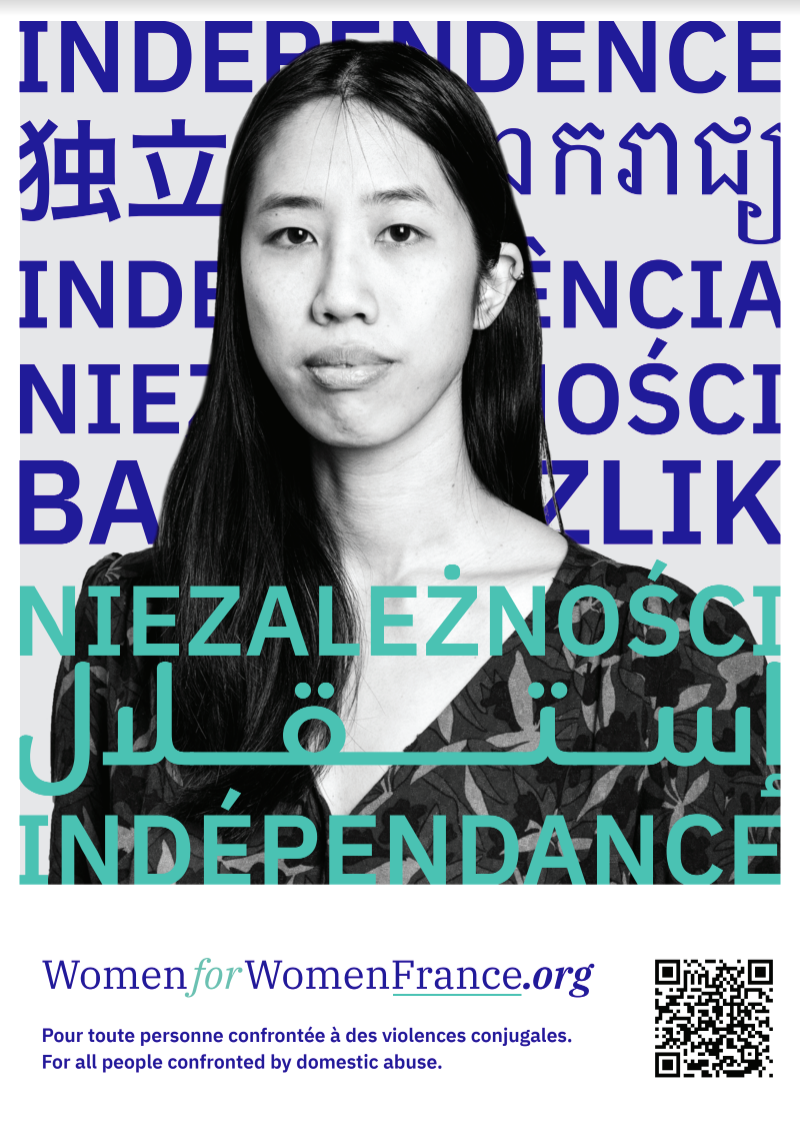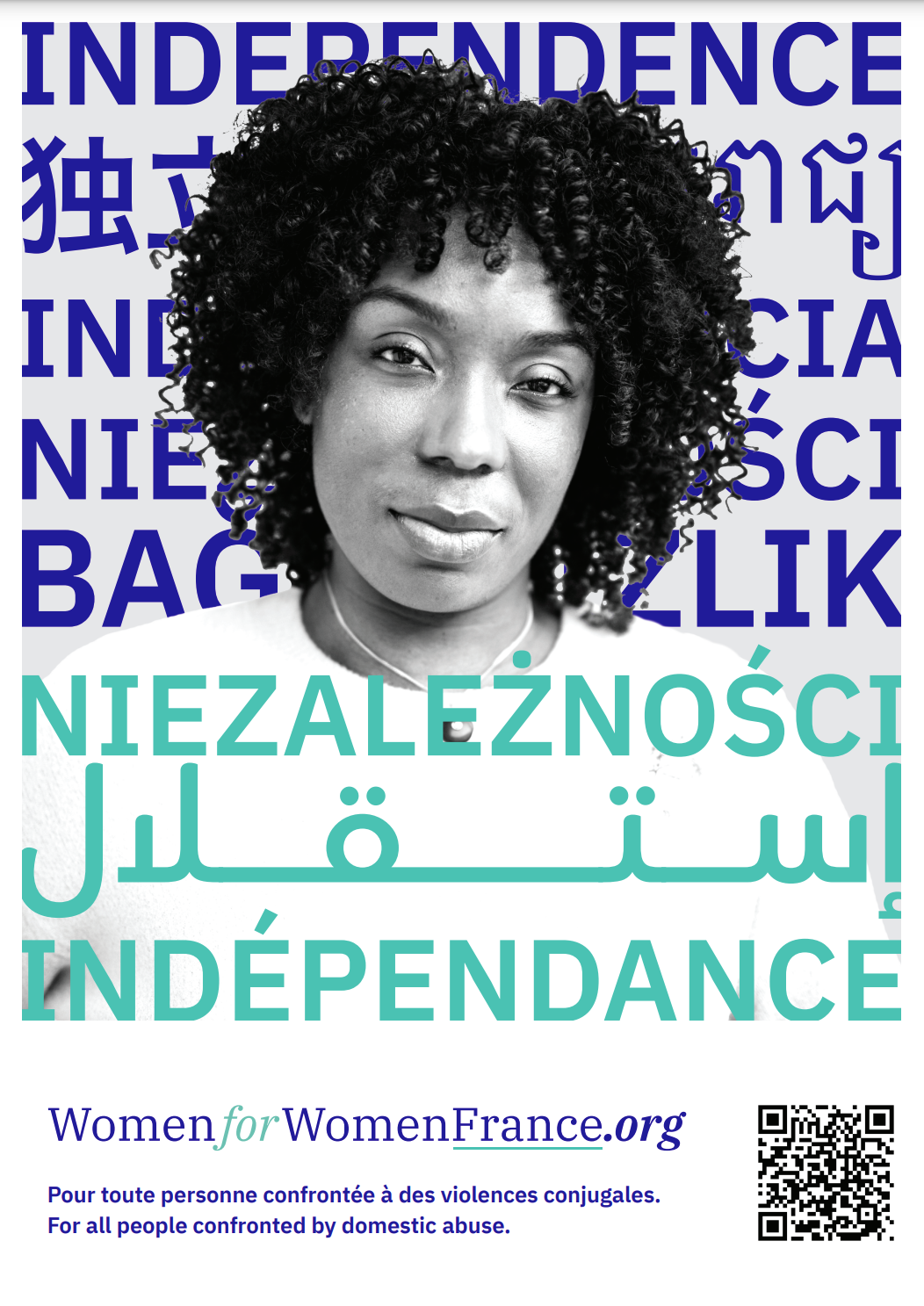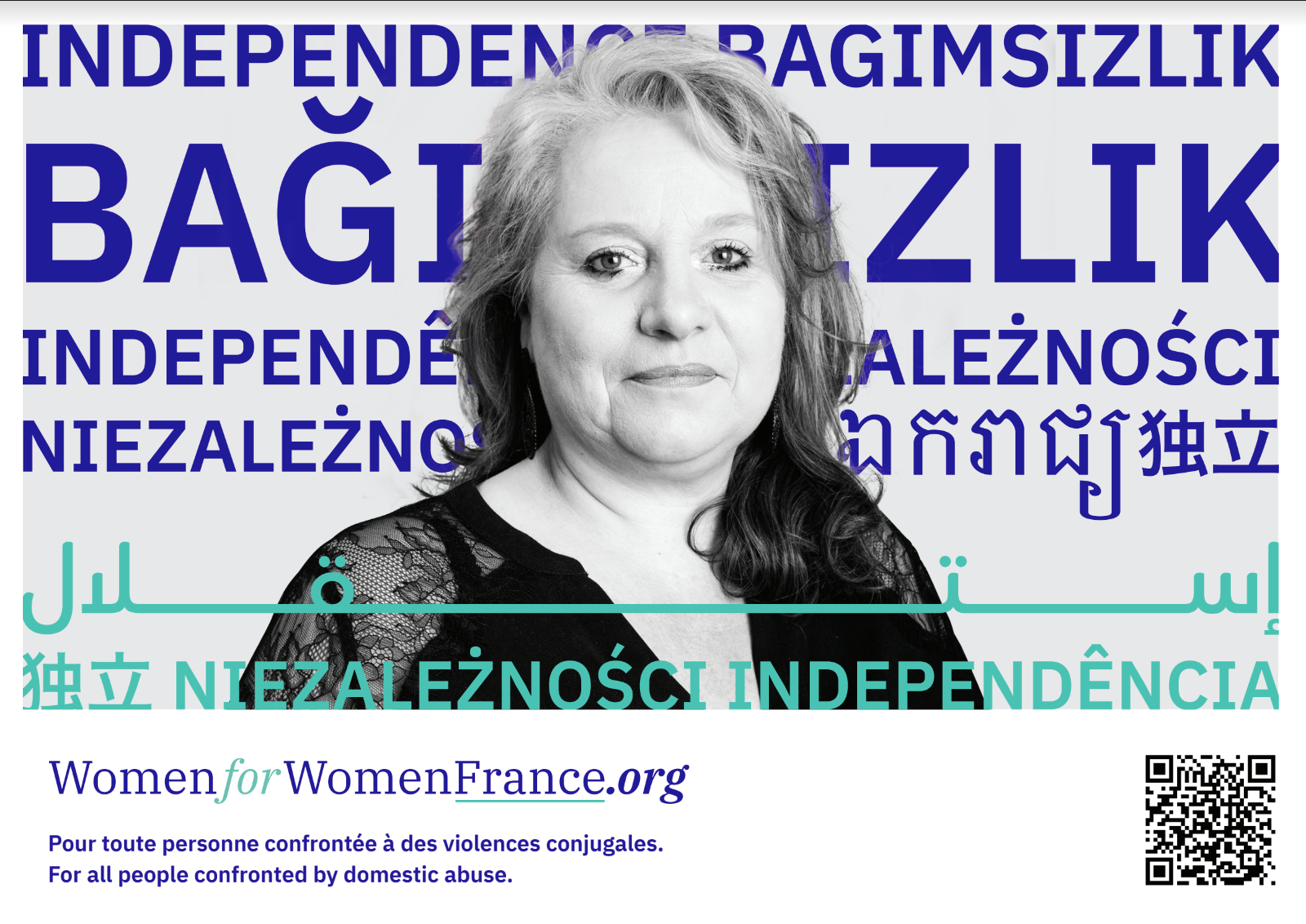Professionals
This online resource centre of information has also been designed for you, first-contact professionals, in order to help you understand and respond to the specific difficulties faced by your foreign-born clients.
Audience
This guide is intended for all professionals who are in a position to assist victims of violence, i.e. doctors, psychologists, lawyers, police officers, staff of associations, hospitals, consulates, town halls, schools, and public institutions (CDAS, CAF, France Travail, etc.).
Victims of domestic abuse are often vulnerable and in a state of trauma. The level of support that you are able to provide them with will significantly impact outcomes.
Signposts to download and print
The below posters have been made free to use for all professionals in France: in their waiting rooms, windows, reception areas etc. WFWF recommends professional printing, if possible, due to the high resolution of the posters.
Vulnerabilities specific to foreign-born people
Foreign-born people facing domestic abuse have additional difficulties that compromise their chances of finding security and reestablishing their independence.
-
- increased likelihood of social isolation due to geographic distance from support networks
- higher risk of social isolation in the cycle of abuse
- likelihood of no or limited French language proficiency
- increased risk of facing discrimination.
-
- fewer opportunities to obtain employment
- higher risk of facing economic abuse
- high risk of facing discrimination when seeking employment and stable, long-term accommodation
- significant barriers in obtaining autonomy over financial affairs, such as bank accounts, insurances, and taxes.
-
- high risk of anxiety relating to immigration status, particularly in the case of partner-sponsored visas
- reduced likelihood of understanding legal rights in France, as well as the institutions and processes of legal intervention and recourse
- higher risk of facing administrative abuse
- greater complexity in resolving family law matters due to international considerations regarding separation of assets, child custody, and divorce
- significant barriers in gaining autonomy over administrative affairs, such as driver’s licence, health insurance and social security.
Information quality
The information offered on this online resource centre is based on consultations with victim-survivors from diverse economic and social situations, and countries of origin.
WFWF works with highly specialised experts in their respective fields to ensure the quality of the information provided on this online resource centre. Each guide created by WFWF has been reviewed three times by independent experts.
The translations were carried out by specialised translators and all translations have been proofread.
The guides are all written in a tone which is intended to be reassuring. Nevertheless, they are realistic and describe how to assert rights and access services, step by step. They also provide practical advice on how to overcome the common dysfunctions often encountered in the French system and also address the common apprehensions that victims can have.
Each practical guide will be reviewed and updated every four months.
Special features and tools
-
Most guides contain words that are not translated. We have deliberately left them in French, in “quotes”. This is intended to assist the user to become familiar with words they will frequently encounter on their journey. Explanations of untranslated words are provided within the text.
-
The WFWF immigration questionnaire will assist you to identify the elements of your client’s situation that might enable them to benefit from residency rights in France. Select the elements corresponding to their situation so that you can then direct them to the application process, step by step.
-
This letter addressed for the French police services can help your client to communicate with an officer if they do not speak French fluently and/or if they want to be sure that they respect their rights: for example the fact of having the right to ask for their help without triggering an immigration procedure, and the right to have access to an interpreter. This letter was co-written by the French National Gendarmerie, the French National Police and WFWF.
-
At the end of each guide, you will find the specialised support service relevant to the subject of the guide.
-
Emergency numbers are constantly present at the bottom of every page of the Online Resource Centre. You or your client can quickly contact the police services by phone, sms and chat.
Navigating the Online Resource Centre to meet your client’s needs
-
You can search for information by theme and in each of the languages available on the Online Resource Centre.
You can do this in three different ways:
- by searching for keywords in the search bar at the top right of the page
- use the “Our resources” section in the main menu to go to the subject that interests you, on the left at the top of the page
- through the home page.
To provide your client with resources if you don’t speak their language, you can:
- research in your own language to find a guide, then select your client's language at the top of the page to translate the selected guide
- ask your client to find the guide in the language of their choice, then change the guide into your language to assist you to identify their concerns.
-
All pages are printable to allow you to share this information with your customers who do not have access to digital devices. You can find a guide in your own language, then select your client's language at the top of the page to translate the selected guide.
-
Quick and easy-to-use to share functions can be found on the top left of each guide. Check first that your client consents to you sending them infomation, in case their abuser is monitoring their accounts and electronic devices.
Best practice
Doctors, associations, hospitals, psychologists, lawyers, consulates, town halls or even police officers are often the first professionals to whom a person confronted with violence confides.
Victims are often vulnerable and in a state of trauma. The level of support you are able to provide will determine outcomes.
We have compiled a simple list of do's and don'ts for your personnel, based on feedback from survivors.
| Do | Don't |
|---|---|
| Take the time to listen to them carefully, even if their level of French is limited. | Do not interrupt them if they have trouble expressing themselves. |
| Try to find solutions to communicate in another language, for example a written or oral translation application (ex: Google Translate). | Don't hang up on them if they have trouble expressing themselves or have a strong accent. This could create a suicide risk. |
| Believe her. Research shows false accusations by women are statistically uncommon. | Do not question the reality of the abuse. |
| Explain to them that the only person responsible is the perpetrator of the abuse. | Do not ask them what they did or what choices they made before or during the abuse. |
| Offer to fill out a witness statement, which could help them if they decide to file a complaint in the future. | Do not contact their abuser, even if you know the abuser and you trust them. This could put the victim’s life in danger. |
Refer them to resources or qualified experts. Such as:
|
Do not give advice in an area in which you are not qualified. Laws and procedures change regularly. |
| If they do not speak French, offer to help them contact a service or a professional by helping them make the call in French. | If they do not speak French, don't give her the phone number or email for French-only services, without offering to help contact them. |
| Let them make their own decisions, at their own pace. Respect their choices. | Don't tell them what they should do. |
| Remember that all victims react differently. All reactions to trauma are normal: denial, anger, calm, distress, crying, screaming, and even contact with the aggressor. | Don't judge how they should react. |
| Respect their cultural and religious choices. | Do not tell them that their cultural or religious choices are not normal in France. |
Other resources available to you
- You can call 3919, the national helpline for victims of gender-based violence, and people and professionals supporting them.
- You can keep a record of things you witness on https://memo-de-vie.org, a confidential and secure online space.
- If you are interested in Women for Women France training for professionals, do not hesitate to contact us at [email protected].


